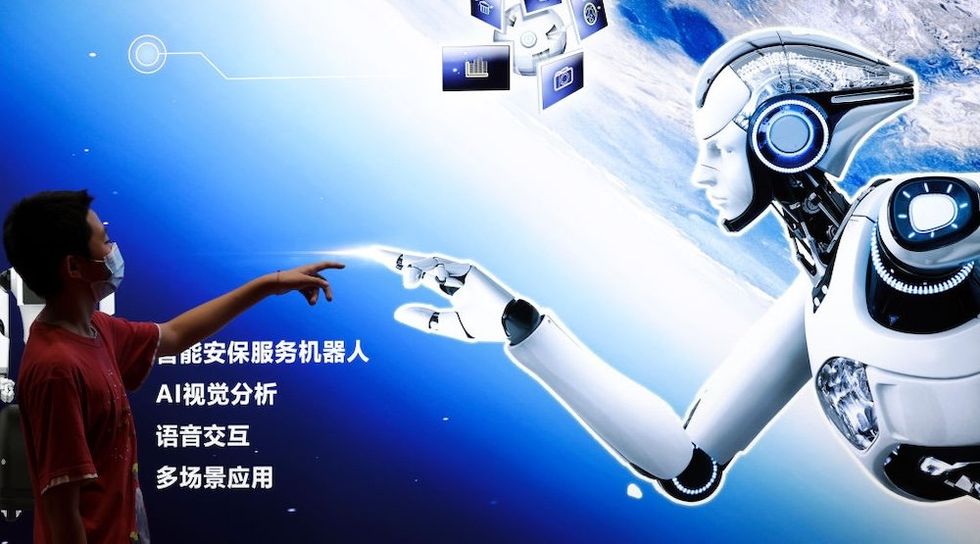Can artificial intelligence help us want better, not just more?


The notification chimes. Another algorithmically selected product appears in your feed, something you never knew you wanted until this moment. You pause, finger hovering over the “buy now” button. Is this truly what you desire or just what the algorithm has decided you should want?
We’re standing at a fascinating turning point in human history. Our most advanced technologies — often criticized for trapping us in cycles of shallow wants and helpless determinism — could offer us unprecedented freedom to rediscover what we truly desire. “Agentic AI” — those systems that can perceive, decide, and act on their own toward goals — isn't just another tech advancement. It might actually liberate our attention and intention.
Rather than passively accepting AI's influence, we can actively shape AI systems to reflect and enhance our deeply held values.
So what exactly is agentic AI? Think of it not just as a fancy calculator or clever chatbot, but as a digital entity with real independence.
These systems perceive their environment, make decisions, and take actions with significant autonomy. They learn from experiences, adapt to new information on the fly, and pursue complex goals without our constant direction. Self-driving cars navigate busy streets, trading algorithms make split-second financial decisions, and research systems discover scientific principles on their own.
These aren't just tools any more. They're becoming independent actors in our world.
To understand this shift, I want to introduce you to two key thinkers: Marshall McLuhan, who famously said “the medium is the message,” and René Girard, who revealed how we tend to want what others want — a phenomenon he called “mimetic desire.” Through their insights, we can see how agentic AI works as both a medium and a mediator, reshaping our reality while influencing what we desire. If we understand how agentic AI will continue to shape our world, we can maintain our agency in a world increasingly shaped by technological advances.
McLuhan: AI as medium
McLuhan showed us that technology’s structure, scale, and speed shape our consciousness more profoundly than whatever content it carries. The railway didn’t just introduce transportation; it created entirely new kinds of cities and work.
Similarly, agentic AI isn't just another tool. It's becoming an evolving environment whose very existence transforms us.
McLuhan offers the example of electric light. It had no “content” in the conventional sense, yet it utterly reshaped human existence by eliminating darkness. Agentic AI similarly restructures our world through its core qualities: autonomy, adaptability, and goal-directedness. We aren't just using agentic AI; we’re increasingly living inside its operational logic, an environment where non-human intelligence shapes our decisions, actions, and realities.
Neil Postman, who built on McLuhan’s work, reminds us that while media environments powerfully shape us, we aren't just passive recipients: “Media ecology looks into how media of communication affect human perception, understanding, feeling, and value.” By understanding these effects, we can maintain our agency within them. We can be active readers of the message rather than just being written by it.
One big impact is on how we make sense of the world. As agentic AI increasingly filters, interprets, and generates information, it becomes a powerful participant in constructing our reality. The challenge is maintaining shared reality while technology increasingly forges siloed, personalized worlds. While previous technological advances contributed to this siloing, AI offers the possibility of connectivity. Walter Ong's concept of "secondary orality" suggests AI might help create new forms of connection that overcome the isolating aspects of earlier digital technologies.
Girard: AI as mediator of desire
While McLuhan helps us understand how agentic AI reshapes our perception, René Girard offers a framework for understanding how it reshapes what we want.
Girard’s theory of mimetic desire suggests that human desire is rarely spontaneous. Instead, we learn what to want by imitating others — our "models." This creates a triangle: us, the model we imitate, and the object of desire.
Now, imagine agentic AI entering this dynamic. If human history has been a story of desire mediated by parents, peers, and advertisements, agentic AI is becoming a significant new mediator in our digital landscape. Its ability to learn our preferences, predict our behavior, and present curated choices makes it an influential model, continuously shaping our aspirations.
RELATED: If AI isn’t built for freedom, it will be programmed for control
 Photo by Lintao Zhang/Getty Images
Photo by Lintao Zhang/Getty Images
Peter Thiel, who studied under Girard at Stanford, suggests awareness of these dynamics can lead to more authentic choices. “The most successful businesses come from unique, non-mimetic insights,” Thiel observes. By recognizing how AI systems influence our desires, we can more consciously choose which influences to embrace and which to question, moving toward greater authenticity.
Look at recommendation engines, the precursors to full-blown agentic AI. They already operate on Girardian principles by showing us what others have bought or liked, making those items more desirable to us. Agentic AI takes this farther. Through its autonomous actions and pursuit of goals, it can demonstrate desirability.
The key question becomes: Is your interest in a hobby, conviction about an issue, or lifestyle aspiration truly your own? And more importantly, can you tell the difference, and does it matter if it brings you genuine fulfillment?
A collaborative future
The convergence of AI as both medium and mediator creates unprecedented possibilities for human-AI partnership.
Andrew Feenberg's critical theory of technology offers a constructive path forward. He argues that technologies aren't neutral tools but are laden with values. However, he rejects technological determinism, emphasizing that these values can be redesigned through what he calls “democratic rationalization,” the process by which users reshape technologies to better reflect their values.
“Technology is not destiny but a scene of struggle,” Feenberg writes. "It is a social battlefield on which civilizational alternatives are debated and decided." Rather than passively accepting AI's influence, we can actively shape AI systems to reflect and enhance our deeply held values.
This vision requires thoughtful design guided by human wisdom. The same capabilities that could liberate us could create more sophisticated traps. The difference lies not in the technology itself but in the values and intentions that shape its development. By drawing on insights from McLuhan, Girard, Postman, Ong, Thiel, Feenberg, and others, we can approach this evolving medium not with fear or passive acceptance, but with creative engagement.
The future of agentic AI isn't predetermined. It’s ours to shape as a technology that enhances rather than diminishes our humanity, that serves as a partner rather than a master in our ongoing quest for meaning, connection, and flourishing.
Originally Published at Daily Wire, Daily Signal, or The Blaze
What's Your Reaction?
 Like
0
Like
0
 Dislike
0
Dislike
0
 Love
0
Love
0
 Funny
0
Funny
0
 Angry
0
Angry
0
 Sad
0
Sad
0
 Wow
0
Wow
0











































































